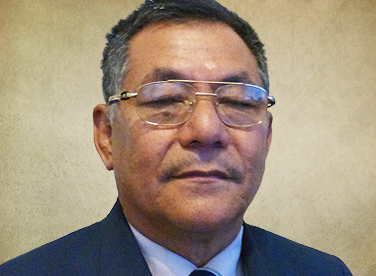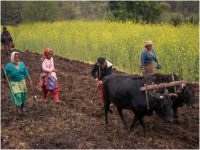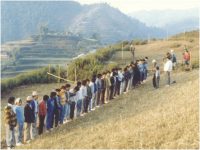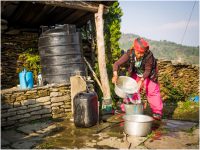Shiva Dhan Rai
Shiva Dhan Rai Colour Sergeant
(Portrait © Gurkha Voices Oral History Project)
-
Ploughing their fields (Photo: Earthducation MT Lab)
-
Galla Wala recruiter visits a village
-
A typical village watering hole (Photo: Earthducation MT Lab)
Photos 1 & 3 courtesy of Earthducation MT Lab; photo 2 courtesy of the Gurkha Museum
-
Audio 1
-
Audio 2
-
Audio 3
Shiva Rai served with the 1/7 Gurkha Rifles. He was born in a small farming village in the Khotang district where he lived with his father, mother, two brothers and two sisters. Shiva’s army travels took him to Malaysia, Hong Kong, Brunei, Hawaii and public guard duty at Buckingham Palace for a short stint. He served in the Falklands as a mortar fire controller. Shiva’s interview audio extracts are accompanied by the transcripts below.
Have you seen our short film of the Gurkhas, made by Colchester’s 308 Air Cadets and viewable by clicking on here.
Shiva Dhan Rai interview transcription:
Audio 1 (1 min 55 secs):
Having retired from the army I have done the Masters degree in humanities, social science, in political science. And I worked as an assistant lecturer in a Nepalese college for 15 years. During that time another incident happened in my life. And the terrorists, who were Maoist people, they suffered me and they kidnapped me because I was a supporter of parliamentary form of government and I was one of the assistant lecturers in my village and I was one of the ex British Gurkha soldiers. They targeted me and they asked me for donation. I didn’t do that [laughs], they could kill me. But every week, every month, they used to come in my home and they asked for money and money. How can I give them every week, every month? And they kidnapped me. At that time president of Nepal, minister, was the Cabinet minister, made a debate with them and a secret agreement to pay some ransom money to rescue for me. And after five days I was rescued from there. Then still my job is there but I left my assistant lecturer job and I came back to the UK with my daughter, first time. And having spent one year as a–, I worked as a security guard in the UK because I didn’t get any highly qualified job here due to my third world country’s academic qualification, then, after a year I called my wife and my son, all my family, and they came here.
Audio 2 (1 min 50 secs):
At that time I was in school studying the business management for first year. During that period I saw many people were recruiting in the Gurkha camp [laughs]. And luckily I saw one of the Galla Wallah, the recruiter who collects the young boys, and register in his register and brings to the depot for recruiting. And I requested him, I also like to join the British Gurkha brigade. Why did I decide this and why I requested him? There was no chance to join the government service for our Rai communities in our country at that time, and all the rulers were Brahman and they were all high level, all the bureaucrats were Brahman or Chhetris, they were. And having done the graduation from the school, I won’t get any best position, good position, somewhere in the Nepalese bureaucracy. I think it’s much better to join the army. If I get chance to join the army I will get an opportunity to visit around the world and as well as I will get a chance to earn a little bit wealth, money, life and money. I decided that. It was [fact 0:07:45] thing and I was lured by the other previous who are the servicemen who used to come and live in Nepal and who were retired. Their living standard was high. That’s why I decided to join the British Army.
Audio 3 (3 mins 54 secs):
I’m from eastern part of Nepal. My district’s name is Khotang and I was born in 1952, 1st January, in [inaudible 0:00:56 place name], near [inaudible 0:00:57 place name]. My father was a retired British Gurkha official from India. He was retired on the rank of Subedar, which is equivalent to Captain QGO [Queen’s Gurkha Officer] at the present. He retired in 1947, then he started to farm. We are from the farmer. We always our forefathers were working as a farmer, keeping cattle, cow, buffalo, goat, cock, whatever, in to get support from, to keep our lives. And my mother was also a farmer wife. And I have two sisters and one elder brother and one younger brother. And we wished to go in the school, but there was no school. Later on one primary school was opened and many people started to go in that primary school, but we were not allowed to go there. And we argued with our parents but our parents replied us, “Okay, if you go school, who will look after the cattles?” It was the very remarkable [laughs] thing in the past life. But later on our parents agreed our request and we were allowed to go in primary school. It was one of the very remarkable things. But before going school, we had to go to the forest and to collect the firewood, about half an hour, one hour. Having done that we were allowed to go to school. After completing the school whole day, we came back to the home and again needed to go somewhere to cut the green grass for our cattles, like cows, buffalos. They need to feed in the evening time. And it was very hard life. And while I had completed primary school, class five, there was no high school very close to our village. Luckily there was one high school very far away. And our father agreed to us to join the high school. And it was three hours to walk from home to school and whole day school. After four, we needed to back to home, walking, three hours. So it is very difficult to explain how we were tired. All day the teacher taught us the lesson and three hours way to school and three hours back to home. While we came back in home, again our parents asked to us to do some other extra stuff, to collect some green grass for the cattles or to collect some firewood or to collect some new harvest, whatever, seasonable. So it was a very hard life. However, in 1968, luckily, I passed the high school and my father advised me to join the college in the–, very far away. It’s called Taran.
Oral histories: © Gurkha Voices Oral History Project




